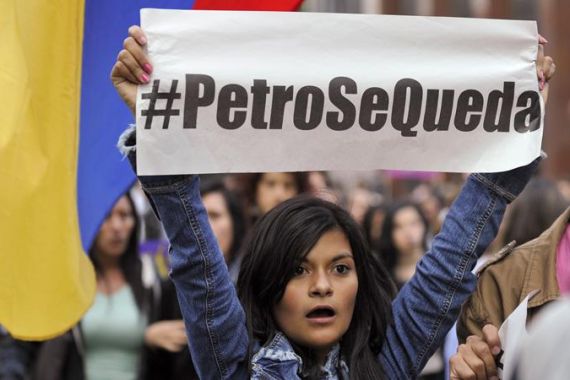The curious case of the mayor of Bogota
Gustavo Petro’s legal team has filed more than 500 complaints to the Constitutional Court about his ousting.

Gustavo Petro was not a popular mayor. In his two years in office at the head of this chaotic city of eight million people, he had lost many allies and supporters. His aloof and often arrogant style had pushed his ratings way down in the polls.
Still, when Colombia’s Inspector General Alejandro Ordo?ez announced his decision to remove Petro, and ban him from running for office for 15 years, many here disagreed.
Petro might not have been the most effective manager but his administration was not as corrupt as some of his predecessors they reasoned. For many, the penalty seemed disproportionate to the mistakes.
The inspector general also sanctioned Bogota’s previous mayor, Samuel Moreno, who is accused of serious corruption charges, but simply suspended him for a year.
Petro’s sin was that he botched the overhaul of the city’s garbage collection and management system which had been in the hands of private companies.
Hundreds of families in Bogota make a living selling recyclables that they collect from garbage cans across the city. The mayor’s plan made them part of the public collection system, receiving pay for their services.
But Petro’s administration was not up to the task. For three days garbage piled up on the streets until he had to call the private companies back.
This debacle was at the centre of the inspector general’s decision to kick him out.
Peace icon
But for many observers there’s more to the story than just a simple sanction over the mayor’s handling of garbage collection.
Petro, a former guerrilla of the now defunct M19 movement, is an icon of the left and could have had a shot at the presidency. Furthermore he is the poster child of a previous, successful, peace process.
He gave up weapons and entered politics as an anti-corruption crusader. He became famous for exposing the ties that linked many Colombian politicians with paramilitary groups in the country.
It’s easy to understand the consequences that his ousting might have while the government is in the middle of another peace process, this time with the biggest rebel group, the Revolutionary Armed Forces of Colombia (FARC).
Only a month ago the government and FARC announced they had reached an agreement on the second point of the talks agenda, on guarantees for political opposition in Colombia.
“It’s not a very good message to those members of the guerrilla movement who aspire to enter politics legally in the future”, Political Professor Arlene Tickner, told Al Jazeera. “The question that remains in this case and others previous to it, is what constitutional guarantees are there that the political left will be able to participate in the legal political fold.”
The inspector general who took the decision to remove Petro from office doesn’t seem to be bothered by this. Ordo?ez is a very conservative, traditionalist Catholic, and an ally of former President Alvaro Uribe, the biggest enemy of the current peace process.
Political discontent
It’s not the first time that Ordo?ez has used the power of his office to oust political enemies. He famously banned leftist Senator Piedad Cordoba for alleged ties with FARC, while clearing congressmen who had ties with paramilitary from wrongdoing. He threatened disciplinary action against judges and other public officials who perform gay marriages.
The ousting of Petro though seems to have touched a raw nerve. For days, tens of thousands have rallied in favor of the mayor, some sleeping in tents in front of city hall. The mayor said this is the beginning of a new movement in Colombia, and compared the crowds to those in the Arab Spring, and Plaza Bolivar to Cairo’s Tahrir square.
Some politicians are now openly saying it’s time to change the constitution to tame the power of the office of the inspector general. Other’s are saying that Ordo?ez didn’t have the right to remove him and only the President has that authority.
The legal trappings of this story are still unclear.
Petro knows the demonstrations alone will not be enough to change the inspector general’s ruling. He can only appeal to the inspector general’s office itself, but his legal team has filed more than 500 complaints to the Constitutional Court.
This week he’ll meet with President Juan Manuel Santos who has been silent on the issue so far, fearing perhaps that taking sides might affect his chances for re-election.
Petro will also fly to Washington to meet with the Inter-American commission of Human Rights hoping to get support from the international community. He will need his supporters to keep the pressure on back home until January when the inspector general will respond to the mayor’s appeal.
If the decision is upheld, Petro will have to leave and be removed from politics for 15 years. Regardless of the final outcome, his removal has touched off a wave of discontent that will likely have repercussions on Colombia’s political stage for some time.